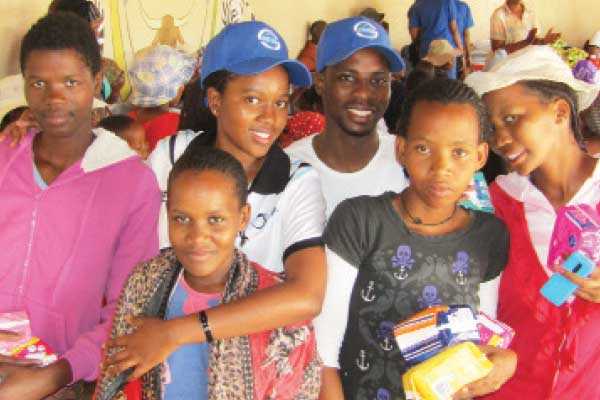The indignity of life without sanitary pads
As she removed her scarf from her shoulder to paint a picture of their plight, 22-year old *Neo Mosime* from Tshwaane settlement in the Kgalagadi district brought guests from Gaborone to tears last week.
“You see this scarf, it is just one of materials that a lot of us girls and women here use every month during our menstruation,” she said. She went on to say that in Tshwaane, they have only five small tuck-shops which hardly sell sanitary pads. If ever they have them, traders sell them for double. For example, a small packet of 10 sanitary towels usually sold at P10.00 in Gaborone sells for P20.00 in Tshwaane. The truth, according, to Mosime is that, tuck-shop owners take advantage of the fact that sanitary pads are a rare commodity in the area. But again, the girls use toilet papers, she revealed.
A teenager from Tshwaane told Botswana Guardian that she sometimes uses Daily News newspaper during her period, which is distributed freely there. “Sometimes I even miss school because of this situation. There is nothing we can do,” she said. Most women and girls interviewed said that they use old pieces of cloth in place of cotton wool during their periods. “Most of the time I use discarded pieces of old cloth the rest of the family no longer wish to wear,” said another teenager.Another one said that she also uses torn clothes and toilet paper. “However, the challenges with using pieces of cloth is that the blood can dry up and produce a putrid smell and toilet paper is too absorbent and does not last long,” she said.
All this was revealed recently when members of the CBET (Publishers of the Botswana Guardian, The Midweek Sun (newspapers) and Botswana Investor Magazine) Social Club went to Tshwaane to donate sanitary pads to women and girls. The initiative, dubbed ‘Pad-Drive,’ was undertaken in August during the commemoration of Women’s month. When thanking the team for responding to the needs of females in his area, Tshwaane Kgosi, Othusitse Sengawane said they were faced with a severe lack of resources. Other than lack of sanitary wear, he said there was high unemployment in Tshwaane. As a result many young people have resorted to alcohol and drug (dagga) abuse. “The youth have become uncontrollable because of abuse of alcoholic substances and drugs,” he said.
When there is lack of sanitary wear
In 2014, it was reported that in Zimbabwe women and girls in rural areas were using cow dung during menstruation because they could not access proper sanitary wear. When the-then Proportional Representation legislator Priscilla Misihairabwi-Mushonga introduced a motion calling for the scrapping of duty on sanitary wear in the National Assembly, many MPs were touched as they heard how some women in the rural areas were using unhealthy means such as cow dung, maize stalks and even leaves as pads during their monthly periods.
Traditionally, the issue of menstruation is a private matter that is not discussed openly. Many women prefer to hide the fact that they are having their period due to the stigma attached to it. Not only is proper sanitary wear effective in preventing leakages of blood while menstruating, but it also prevents the odours that accompany menstruation, according to health experts.
Toilet paper is also said to be dangerous in that some of it contains chemical colourants which pose a health threat, according to a local gynecologist. In 2012, the Botswana National Front (BNF) launched a campaign on sanitary pads dubbed, ‘Ensuring the Dignity of Women.’ The party said that it was going to challenge government to provide free sanitary pads to poor girls in rural areas, provide a platform for the girls to freely discuss issues of menstruation and urge members of the public to make donations to this noble project that is directly linked to human dignity. When he was leader of Opposition, Botsalo Ntuane became the first politician to make a special mention of sanitary wear, by tabling a motion calling for free provision of sanitary pads, especially in schools and public health centres.
Reusable sanitary wear
Local businesswomen, Lady Noble and Rona Tshiamo who trade under the name, Tripple Diamond, currently sell a reusable Pad called ‘Subz’- a washable sanitary towel that is reusable and needs not to be discarded. It is said that one pack which contains three pairs of panties, nine washable pads, nine plastic sealable bags for only P250 can be used for up to five years.Once it is used, the soiled pad is placed in a sealable packet for washing later. This product, according to its sellers, consists of an absorbent 100 percent cotton panty that allows the skin to breathe and hold up to 25-30 ml of discharge.
Meanwhile, New York is on track to become the first city to require free tampons and sanitary pads in public schools, shelters for the homeless and jails after lawmakers approved the idea this month amid a national discussion on the costs of having a period.The proposal, which Democratic Mayor Bill de Blasio’s administration supports, marks a new direction in activists’ push to dismantle what they see as unfair financial barriers between women and needed sanitary products. City Councilwoman Julissa Ferreras-Copeland’s proposal would make pads and tampons free in restrooms that serve 300,000 schoolgirls, and it would guarantee the products’ availability to 23,000 women in homeless shelters and add the force of law to jail standards about sanitary supplies.





